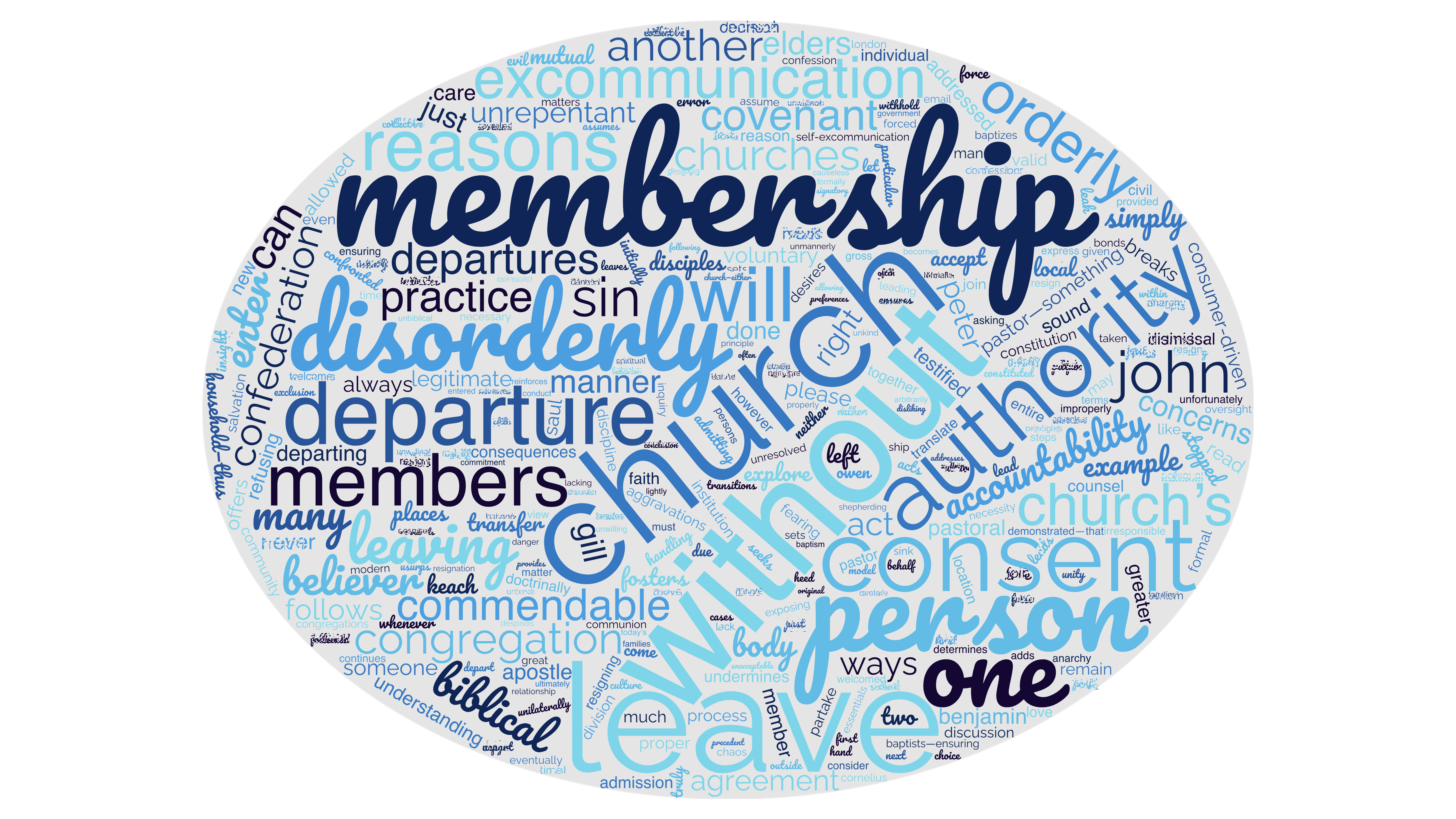Joining and Leaving a Church

The Example of the Apostle Peter in Church Membership
Consider the Apostle Peter in Acts 10 before he baptizes Cornelius and his household—thus admitting them into church membership. What does he do? He seeks the counsel of the other disciples, asking if there is any reason to withhold baptism. He does not act unilaterally but ensures the collective agreement of the church. If the apostles followed this practice, how much more should the elders and the congregation do so together?
John Gill offers insight on this matter:
“As the original constitution of churches is by consent and confederation, so the admission of new members follows the same principle. No man is to be forced into a church, nor can he force himself into one. He has no right to enter or depart at will; rather, both must be done with the church’s consent.”
Gill highlights the necessity of mutual agreement in church membership. Saul, for example, sought to join the disciples, but they initially hesitated, fearing his past conduct. Only after Barnabas testified on his behalf did they accept him, ensuring he was a true believer.
Admission into the church is a voluntary act, both for the individual and the congregation. It is not merely the decision of the elders but of the entire body. The church, as a voluntary society, determines who joins and with whom they will worship.
The Proper Way to Leave a Church
John Gill also addresses the ways a person may leave a church:
“There are but two ways of departing from a church—either by a formal dismissal or by excommunication.”
In today’s culture, many assume they have the right to leave a church whenever they please, without accountability. However, entering into a church covenant places a person under the authority of the church body. Just as one does not enter without the church’s consent, one should not leave without it.
There are legitimate reasons for leaving a church, which we will explore, but departure should always be done in a commendable manner, for commendable reasons, and to a commendable church. It should never be simply because of personal preferences, such as disliking the pastor. Unfortunately, in many modern churches, people are welcomed into membership with church consent, but then allowed to leave on their own terms without accountability. This was never the practice of our forebears.
The Error of Resigning Membership at Will
Benjamin Keach, a signatory of the Second London Confession of Faith, reinforces this understanding:
“No person has the authority to dismember himself from the church. He cannot, without great sin, translate himself from one church to another without an orderly dismissal, provided the church is properly constituted and not lacking in essentials of salvation or church communion.”
If a church is doctrinally sound, a believer should not leave arbitrarily. Leaving a church should not be done lightly, as it places a person outside the care and authority of the church, exposing them to spiritual danger. A believer should always remain under the shepherding care of a local church. If a move to another location is necessary, proper steps should be taken to transfer membership so that they remain under church oversight.
This is why, as a church, we read letters of transfer when members come from other congregations. We are following the historic practice of the Particular Baptists—ensuring that membership transitions are handled in an orderly manner. Disorderly departures, on the other hand, can lead to excommunication.
The Consequences of Disorderly Departure
Excommunication occurs in two ways:
- For Unrepentant Sin – When a person continues in gross, unrepentant sin, the church follows biblical discipline, ultimately leading to excommunication.
- By Exclusion – When someone leaves the church disorderly, refusing to heed the church’s counsel, their departure itself becomes an act of self-excommunication. In such cases, the church is left with no choice but to formally declare what they have demonstrated—that they are not truly of the faith.
John Owen warns against allowing such disorderly departures:
“To let someone resign membership without due process is to partake in their sin.”
If a person desires to leave simply because they are unwilling to be reconciled or have been confronted with sin, that is not a valid reason for departure. Even when there are legitimate concerns, such as a lack of edification, those concerns should first be addressed with the church’s elders before a decision is made. Sending an abrupt resignation email without prior discussion is not the biblical model for handling such matters.
Reasons Not to Leave a Church in a Disorderly Manner
Benjamin Keach provides 16 reasons why leaving a church improperly is unbiblical:
- It is an unmannerly and disorderly departure.
- Such behavior is unacceptable in families or civil societies; how much more in the church?
- It undermines the pastoral relationship and sets a precedent for others.
- If individual members can leave at will, so could the pastor—something no one would accept.
- It breaks the covenant made with Christ and the congregation.
- It fosters schism and division.
- It despises the government of the church.
- It usurps the authority given to the church body.
- Just as one cannot enter a church without consent, neither should one leave without consent.
- It is unkind and irresponsible for another church to receive such individuals without inquiry.
- Such disorder leads to chaos in local churches.
- It assumes a false, universal view of church membership.
- It is like a leak in a ship that, if not stopped, will eventually sink it.
- It fosters anarchy and undermines pastoral authority.
- It disrupts the bonds of love and unity within the church.
- It often indicates unresolved guilt on the part of the departing member.
John Owen adds:
“When persons are members of churches by mutual confederation and express consent, causeless departure is an evil of many aggravations.”
Conclusion
The church is not a consumer-driven institution where members come and go as they please. It is a covenant community governed by biblical principles. Membership should be entered into with commitment and left only through an orderly, commendable process.
Next time, we will explore the valid reasons for leaving a church and examine the consequences of disorderly departures in greater detail.
“Receiving And Removing By Consent” (Baptistic Congregationalism)



Leave a Reply